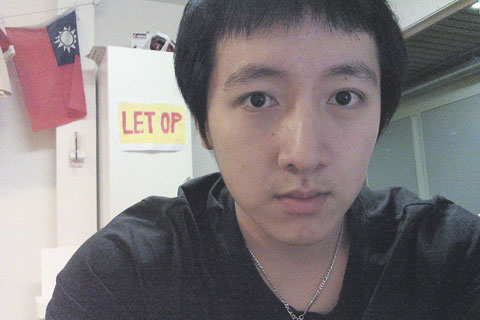Michael Hsieh, 24, Taiwan,
Erasmus Mundus, Optics in Science and Technology
“For me, the BBS – Bulletin Board Systems – became the center of my life when I started my BSc study in Taiwan.
Michael Hsieh, 24, Taiwan,
Erasmus Mundus, Optics in Science and Technology
“For me, the BBS – Bulletin Board Systems – became the center of my life when I started my BSc study in Taiwan.
Information about schools, study associations and curriculum (where students post evaluations for courses and professors) are all on this platform. There are also lots of hot topics on BBS, like, for example, a category called ‘hate’, where people post their complaints about almost everything, or ‘beauty’, where students post links to pictures of beautiful babes and hot dudes, and almost any other topics you can think of. Although BBS is a very old system where only texts are available, it became such a popular culture that we developed a special ‘language’ – like today’s twitterature. Weird things also happen there: I was asked out several times by a creepy guy who didn’t realize I was also a guy.
After I went to study abroad, I don’t use BBS that much. I used to have a personal blog on BBS but have now shifted t to Facebook. It’s hard to follow and share things on BBS when I’m living in a different world.
Other than BBS and Facebook, Google maps is very important and handy. I use it to go to places, especially when I first arrived. Ten years ago I always had to go through huge directories of buses and piles of city maps to get places, but now with all kinds of apps it sure is hard to get lost, even on a foreign continent.
I can’t seem to recall life before internet. I only remember that spending more than three hours online when I was a teenage boy would really annoy my parents, whereas now if I don’t spend the whole day online I’m losing contact with the world. But the interesting thing is that I don’t think we really become more ‘intelligently informed’ by constantly taking in news and all sorts of information. Of course there are more channels to gather information, but at the same time I get distracted by huge amounts of hyperlinks, social media, advertisements, etc. And I think that easy access to information online makes me wonder and doubt about the importance and integrity of what I come across. It sure is an amazing – and scary – infinite space, the online world.”
My favorites:
telnet:\ptt.cc
http://maps.google.com.tw/
Den Haag, donderdagmiddag 18 februari. Het was dringen op de trap in de Glazen Zaal om alle heren rond Maria van der Hoeven op de officiële foto te krijgen. Daarna volgde de ondertekening en mocht iedereen een biosteen in de kerstboomvormige groene kast zetten.
Tot zover het protocol.
Wat telt is natuurlijk dat het onderzoek naar groene grondstoffen, dat onder directeurschap van prof.dr.ir. Luuk van der Wielen (Technische Natuurwetenschappen) plaatsvindt, doorgaat en versterkt zal worden.
“Hier worden bijdragen geleverd aan een nieuwe economie”, verklaarde de minister, “waarin niet-voedselgewassen de grondstof gaan vormen voor nieuwe materialen en producten. Dat levert nieuwe kennis op, nieuwe banen en nieuwe kansen. We zijn op weg naar een post-fossiel tijdperk en een bio-based economie.”
Ook Rein Willems, in zijn rol van voorzitter van de Regiegroep Chemie, verklaarde dat de chemische industrie de afhankelijkheid van aardolie als grondstof en energiebron in de komende 25 jaar met de helft wil verminderen.
Maar voor het zover is, zijn eerst verdere investeringen nodig, zegt Rob van Leen, chief technology officer bij DSM. Het onderzoek kan nu van start, maar voor industriële toepassingen moet je nieuwe processen eerst uittesten in een proeffabriek. En dat deel van de aanvraag, ter waarde van circa zestig miljoen euro, is niet gehonoreerd.
Het onderzoek en de pilotfaciliteit zijn als één geheel aangevraagd, zegt ook cvb-voorzitter Dirk-Jan van den Berg. De twee onderdelen horen bij elkaar. Waarom het dan toch niet als geheel is gehonoreerd, is onbekend. Van den Berg zegt dat er nu gesprekken gaande zijn voor alternatieve financiering van de proeffaciliteit.
Van der Wielen legt uit dat volgens plannen de proeffabriek gebruik zal maken van de bestaande fermentatieopstelling van DSM die aangepast zal worden aan groene grondstoffen. Bovendien zijn er bijdragen toegezegd uit regionale en nationale ontwikkelingsfondsen. Van der Wielen schat de kans groot dat de proeffabriek er toch gaat komen. Rob van Leen (DSM) dringt wel aan op haast (dit voorjaar) en zegt dat zijn bedrijf anders ook in China of Verenigde Staten de weg weet.
BE-Basic staat voor een vergroening van de chemische sector, energievoorziening, materialen en brandstoffen in ecologisch evenwicht met de omgeving. Het consortium telt vier kennisinstituten, negen bedrijven en elf universiteiten, waarvan twee in Duitsland. BE-Basic is de afkorting van biobased ecologically-balanced sustainable industrial chemistry, en is de voortzetting van het B-Basic programma (2004-2009) dat destijds startte met een budget van vijftig miljoen euro.
Meer informatie: www.be-basic.org

Comments are closed.